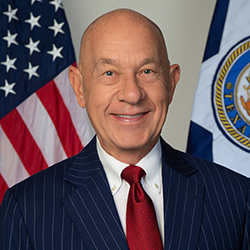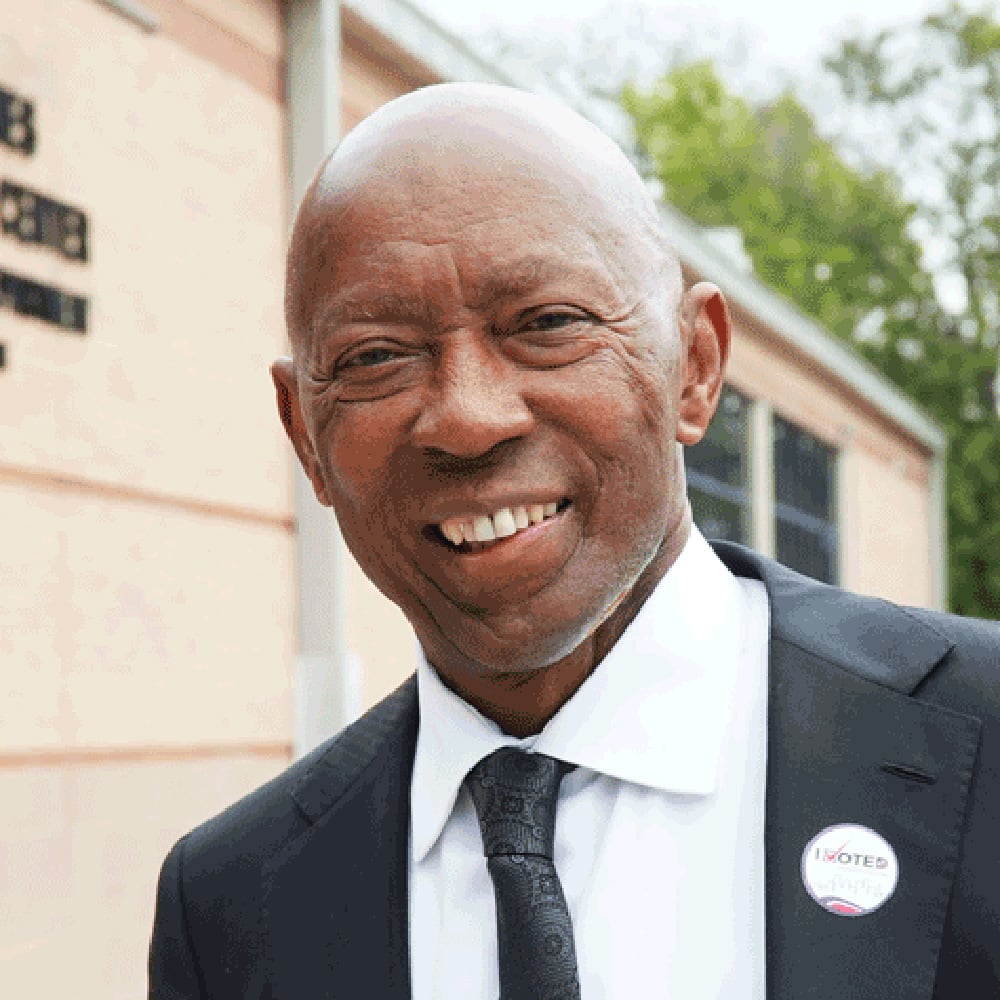I woke up to this on Monday.

Christian Menefee
Harris County Attorney Christian Menefee announced on Monday his bid for the congressional seat left vacant by the death of Democratic U.S. Rep. and former Houston Mayor Sylvester Turner.
“I’m running because working families need a fighter,” Menefee said in an interview. “The fight for the soul of this country is happening right now in D.C., as Trump and Elon Musk roll back programs, lay off federal workers and impact people right here on the ground.”
Menefee filed his intent to run as a Democrat for the seat representing the 18th Congressional District on Saturday evening, hours after a memorial service was held in West Houston for Turner.
Menefee was first elected to county office in Nov. 2020 at 32 years old, becoming the youngest person and first Black American elected to the position, according to his office’s website. He grew up in the Houston-based congressional district and is raising his children there.
“This is home for me,” he said.
As Harris County’s top civil lawyer, he frequently challenged the state’s top Republican leaders, including over voting rights and Republican attempts to exert greater state control over local Democratic governance.
Menefee has also fought legal battles over environmental issues and sought to address the disparate impacts of pollution on communities of color. He has been a vocal opponent of President Donald Trump’s executive orders and signed an amicus brief in a federal lawsuit challenging Trump’s order to terminate birthright citizenship.
In the interview, Menefee said his experience as county attorney prepared him to take on the Trump administration and also work with Republicans when possible.
“There are going to be days where we must stand firm and fight back,” he said, including against efforts by the Trump administration to spend federal funding in a way not authorized by Congress, which holds the constitutional power of the purse. “But there’s also going to be days where it’s about collaboration … I know how to work with Republicans. I’ve done it for the four years that I’ve been in office.”
His priorities in Congress would include expanding health-care access, protecting clean air and water, increasing disaster recovery funding for the Gulf Coast district and improving affordability.
The prospect of the Trump administration ignoring court orders to pursue its agenda factored in to Menefee’s decision to jump in the race, he said. His job since the start of Trump’s second term “has been completely changed.”
“Every day, we are scrambling,” he said, trying to decipher the latest executive order or decision to cut certain programs.
“What I realized very quickly is the fight for our democratic institutions, the fight for ensuring that the branches of government work in the way that they’re supposed to, is happening right now in Washington, D.C.,” he said. “There was a lot of work that I could do as Harris County Attorney to try to blunt some of that, but it’s getting out of control, and it’s moving at a pace now to where we must do everything we can to ensure that Donald Trump is blocked in Washington, D.C.”
Elected officials who announce their candidacy in any special, general or primary election automatically resign their position if they have more than a year and 30 days left of their term, according to a provision of the Texas Constitution. But Gov. Greg Abbott has not yet declared a special election to fill Turner’s seat. Menefee was just reelected to a second four-year term in November.
Just to clarify, that Constitutional provision applies primarily to county officials. State legislators are not included in the list of affected positions. That would of course include Menefee, and the fact that he’d have to resign to run led me to believe he wouldn’t run, as that’s a lot to give up for an uncertain outcome. My interpretation of this reporting is that as there’s not yet actually an election, Menefee hasn’t done anything that would trigger the resign-to-run provision. At least, that was what I thought when I saw the original version of the story, in which Menefee had not yet commented. At this point, I’m not sure what the situation is. Obviously, we’ll know more soon enough. Because I have already been asked the question, if Menefee does resign, Commissioners Court will name a replacement, and there will be an election for the seat in 2026.
Menefee already has some company.
A few years ago, Isaiah Martin’s mentor, the late U.S. Rep. Sheila Jackson Lee, told him to start posting videos on social media. That would be the future of politics, she advised. At first he didn’t think it’d go anywhere. But he was consistent, and he shared daily, unapologetic takes, mainly explaining Democratic stances on political issues.
Soon, he was in the fray.
“I would go into what was called MAGA TikTok lives,” he told The Barbed Wire. “You would have right-wing Republican creators that oftentimes would have debates 8-1 stacked up against me.”
“And I would go and cook them all.”
In excerpts of some of those live debates on his page, Martin beats back at disinformation. He denounces claims, like that cutting the corporate tax rate isn’t a boon for billionaires (the Center on Budget and Policy Priorities found research that President Donald Trump’s 2017 tax cut boosted executives’ earnings but not workers below the 90th percentile); that President Joe Biden was responsible for increasing the national debt (as ProPublica found, Trump heralded an explosive rise in debt in his first term); and that Biden tanked the economy (the opposite is true, as The Guardian reported.)
Martin’s aim, he said, isn’t so much about converting Trump supporters as answering “those questions that they might not have heard a Democrat answer before.”
[…]
In an exclusive interview with The Barbed Wire, Martin said he’s running for Texas’ 18th Congressional District, which covers much of the city of Houston and surrounding areas, and is where he grew up.
Texas’ 18th has had a tumultuous eight months.
Jackson Lee represented the district from 1995 until her death in July of pancreatic cancer. She was succeeded briefly by her daughter, Erica Lee Carter, who completed Jackson Lee’s final term in office, and then by Turner, who had previously served as mayor of Houston after decades in the Texas House of Representatives. Turner also died after being treated for bone cancer.
The successive losses mean the 18th District will have a fourth representative in less than a year, Martin or otherwise. Although Gov. Greg Abbott has yet to announce the date of a special election, speculation has already begun over who will carry on the legacy of the political heavy-weights who have long-served Houston’s residents.
It’s a tall order.
In 1972, in that same seat, the late Rep. Barbara Jordan became the first Black woman elected to Congress from the South. Anti-poverty activist Mickey Leland also held the position and was succeeded by his friend Craig Washington, until Washington was handily defeated in 1994 by Jackson Lee.
In 2023, Martin ran to take over Jackson Lee’s district seat as she vied to become mayor of Houston. After her loss to (former state senator and current mayor) John Whitmire, Jackson Lee decided to try again for another U.S. House term, and Martin dropped out to support her. Afterwards, he said, he didn’t sit idly.
“I went to New York to go and help Congressman Tom Sazi, who’s now elected to Congress. I traveled to places like Oregon to elect Janelle Bynum, traveled to places like Alabama to go and elect people like Shomari Figures, who is right now inside of the United States Congress,” he said. “I’ve been around the country. I’ve campaigned for Democrats up and down the ballot and for Vice President Kamala Harris.”
I assume “Tom Sazi” is a misspelling of Tom Suozzi, who initially won a special election in 2024 to replace George Santos before winning a full term in November. This story also mentioned Menefee’s filing but didn’t provide a link, so as I saw this story before the Trib story I was momentarily confused. Looking at the current list of Statements of Candidacy, in addition to Menefee’s name there’s James Joseph, who ran for Houston City Council At Large #3 in 2023 and finished seventh out of nine. Martin has taken the rhetorical step, but he hasn’t filed the paperwork yet. And I got a press release yesterday from Amanda Edwards promising a “big announcement” for Wednesday, and I think we can all guess what that is. And now that we are past Rep. Sylvester Turner’s funeral, I expect to see more names out there. The Chron, Campos, and Olivia Julianna have more.
UPDATE: Welp.
Harris County Attorney Christian Menefee’s decision to announce his candidacy for the vacant Congressional District 18 seat automatically triggered his resignation, and local Republicans already are campaigning for the candidate he beat last November to take over his job.
The Texas Constitution contains a provision that prohibits certain local officials from running for an office other than the one they currently hold. That provision states that any declaration of candidacy “shall constitute an automatic resignation of the office.”
Menefee’s decision to file a statement of candidacy with the Federal Election Commission Saturday night, just months into his second, four-year term, triggered that provision automatically.
It now falls to the Harris County Commissioners Court to appoint a new county attorney that will hold the office until an election can be held. All five members of the court declined to comment or did not respond to a request to comment on Monday.
The Constitution does not set a deadline for Commissioners Court to make such an appointment, but Harris County Republicans on Monday called for the court to select local attorney and former county civil court judge Jacqueline Lucci Smith, the GOP candidate who lost to Menefee by just 17,000 votes in November.
[…]
In the meantime, the office is not truly vacant. The Texas Constitution allows for the office’s occupant to “holdover” until a replacement is appointed, Deputy County Attorney Jonathan Fombonne said.
“Nothing changes as far as we’re concerned,” Fombonne said. “We’re going to keep doing the good work we’ve been doing for the last four years until someone tells us we can’t.”
In a statement Monday, Menefee also assured the public his office — which defends county officials against lawsuits and provides legal advice to the local government — would continue to operate without disruption.
“The county attorney’s office is filled with talented, selfless public servants,” Menefee wrote. “It has been the honor of my lifetime to serve alongside them. I have no doubt that the office will continue to provide the same level of service to the county and its residents moving forward.”
It seemed increasingly likely that Menefee would indeed have to resign; the only argument against was that the election hadn’t yet been set, which to say the least was flimsy. So here we are. I will say that I have a greater chance of being appointed to replace Menefee than Jacqueline Lucci Smith does, but you go on and dream big.
UPDATE: It’s mentioned in there somewhere, but Erica Lee Carter is Menefee’s campaign treasurer. She has officially endorsed his campaign.


















